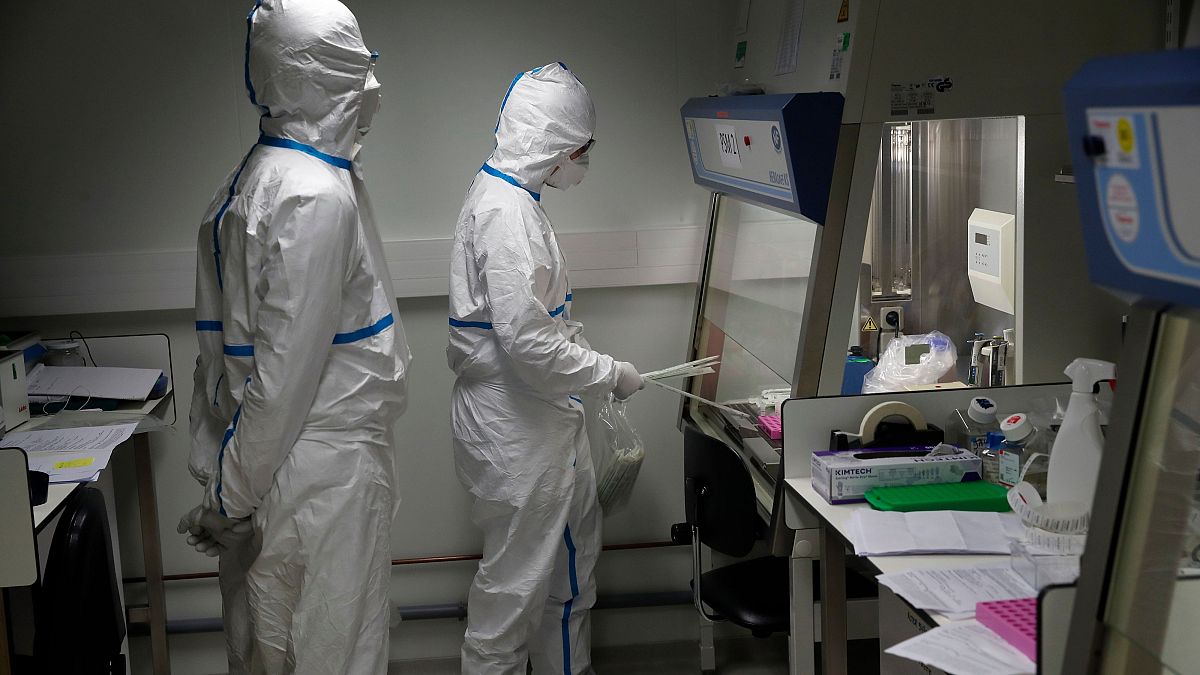More than €7 billion have been pledged to speed up the development of tests, treatments and vaccines against COVID-19
World leaders, international organisations and companies have pledged €7.4 billion to develop new tools to detect, treat and prevent the novel coronavirus.
The funds were pledged during a videoconference summit hosted by the European Union on Monday. The sum raised fell just short of the target of €7.5 billion, but more money could be pledged in the coming days - and the funds will only be the start of what is needed to take on COVID-19, according to the event's leaders.
"All this money will help kick-start unprecedented global cooperation," said Ursula von der Leyen, President of the European Commission, which has pledged €1.4 billion.
Saying they are supporting the World Health Organization’s call for joint action, the leaders announced the launch of an Access to COVID-19 Tools Accelerator, a “global cooperation platform to accelerate and scale-up research, development, access and equitable distribution of the vaccine and other life-saving therapeutics and diagnostics treatments.”
In a statement, the leaders wrote: “If we can develop a vaccine that is produced by the world, for the whole world, this will be an unique global public good of the 21st century. Together with our partners, we commit to making it available, accessible and affordable to all.”
Notably absent from the event was the United States, which has suspended funding to the World Health Organization, and Russia.
President Emmanuel Macron warned that "a race against time is underway,'' as he donated €500 million on behalf of France.
Among the larger contributions, the European Commission has pledged €1 billion in grants and €400 million in guarantees on loans. Japan pledged more than €730 million while Germany offered €525 million. The UK pledged £388 million (€441 million). Italy and Spain, perhaps the hardest hit by the virus in Europe, each said they would provide more than €100 million.
Leaders said that each euro or dollar will be channelled through global health organisations such as CEPI, Gavi, the Vaccines Alliance, and the Global Fund and Unitaid.
The money is being raised towards three main goals.
- Test: New, easily accessible tests are needed to quickly diagnose the disease
- Treat: New treatments are needed to minimise symptoms so fewer people go to hospital
- Prevent: A vaccine is needed to prevent the disease from returning, and to allow life to return to normal
Signatories were: Charles Michel, President of the European Council; Ursula von der Leyen, President of the European Commission; Giuseppe Conte, Prime Minister of Italy; Emmanuel Macron, President of France; Angela Merkel, Chancellor of Germany; Erna Solberg, Prime Minister of Norway.
Solidarity on display
The Wellcome Trust, a UK-based health charity participating in the joint fundraising, praised the outcome of the conference and the "solidarity" it demonstrated.
"It’s absolutely critical that we leave nobody behind and that political commitment that you’ve heard today from many, many world leaders is something we want to celebrate," the charity's Head of Global Policy Alex Harris told Euronews.
Meanwhile the EU’s common reserve of medical equipment, established in April to combat coronavirus, has sent out hundreds of thousands of masks to Spain, Italy and Croatia on the weekend.
”We have worked around the clock to build up the rescEU reserve of medical equipment. We have already created a stock of masks. Spain, Italy and Croatia will be the first to receive equipment, but more deliveries will follow. I thank Romania and Germany for being the first Member States to host the rescEU equipment,” said Commissioner for Crisis Management, Janez Lenarčič.
Race for a vacccine
The scientific consensus appears to be that it could take at least 18 months to make a vaccine for coronavirus, and even that would be a stunning accomplishment.
Even after one has been found, there will be major challenges to manufacture and distribute it on the required scale.
Dr. Anthony Fauci, the director of the National Institute of Allergy and Infectious Diseases in the US said: "Hopefully, by the time we get to this coming winter, we will know whether or not we have a safe and effective vaccine, and then the challenge will be to scale it up enough to be able to distribute it meaningfully."
Advanced research is taking place in China, the US and several European countries. There are now over 100 vaccine candidates in development around the world, but at this early stage there's no way to predict whether any will be successful.
"The name of the game is to have as many shots as possible in order to hit the target," The Wellcome Trust's Alex Harris told Euronews.
He said international collaboration will be key to build the huge manufacturing capacity needed to produce a vaccine on a global scale.
“We need everybody to work together, and no one country can solve this," he said, urging the United States and China to join the latest fundraising drive.
There are now more than 3.6 million confirmed COVID-19 cases worldwide, and the global death toll from the disease has topped 250,000, according to a tally by Johns Hopkins University.
Since April 1, the number of new cases recognized by the WHO every day has remained between 70,000 and 90,000 new cases per day.
